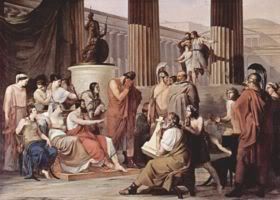
If the ancient epic bard had the same ability as a gamer to shape the story as he saw fit, to add for example an ambassador to the “Embassy to Achilles,” (see here) what about the bard’s audience? We’ve already seen that Phemius, the bard of Ithaca was, according to the Homeric bard of Odyssey Book 1, looking to sing the song that would please his audience most; that is, an ancient bard had an audience, and that audience had a degree of control over his song. The bard could tell the story as he liked, but he had to worry about whether it would help him make a living, and he was thus part of a larger community of people, all of whom were participating in the creation of the epic.
Isn’t there something here that breaks the comparison between ancient epic and video games? If the bard had to work with his audience, the way, say, a professional storyteller or an improvisational comic does today, doesn’t that mean that the gaming comparison has a fatal flaw, because it doesn’t account for that community element? Isn’t gaming, after all, an isolating activity? If the gamer is like a bard, isn’t he like a bard who never gets to perform, never brings his tales alive? Isn’t gaming, then, the death of the bardic tradition instead of its new life?
You won’t be surprised that I’m going to argue against that point of view. In this post and in the next few posts, I’m going to take my argument about interactivity into new territory. That territory is defined by two key terms that I think are fundamentally, though surprisingly, related: community and immersion. I’m going to show that the living epic model actually uncovers an aspect of gaming that usually gets covered up by what gaming looks like—individual people sitting on couches and desk chairs, wrapped up in moving images on their screens. I’m going to show that instead of dooming my comparison, the matter of the bard’s audience actually makes that comparison absolutely crucial.
I’m going to demonstrate, that is, that video games, through the very immersiveness that makes them look isolating have an amazing power to create communities as strong and constructive as the ones created by ancient epic. To put it simply, the community function of immersion, the way that immersive storytelling like epic and video games creates relationships between artists and audiences, and among audience-members, doesn’t—can’t—go away. That’s why game-companies have had to start hiring community-managers.
More on that part of the equation—the gamers-forming-unstoppable-communities part—later. For now, I want to look at the relationship between the bard and his audience through the myth of the epic tradition, and to begin to compare it with the relationship between game-makers and their audiences, the gamers, through the myths of the games they make.
I think the best way to do that is to go back to the moment in Book 8 of the Odyssey that we looked at in light of the sandbox-to-rails continuum a few weeks ago. In this passage, we find Odysseus, who’s in the audience of the bard Demodocus in the quasi-fantasy land of Phaeacia, investing to an extraordinary extent in Demodocus’ heroic songs. He sends over to Demodocus a really nice cut of meat, and then says to him:
Demodocus I praise you above all mortals.To understand where I’m going to take this passage now, you need to know that when Demodocus sings this song, Odysseus weeps. When Odysseus weeps, the king of the Phaeacians asks him who he is. When Alkinoos asks Odysseus who he is, Odysseus responds (we’ll look at this in detail in a future post) that he was enjoying Demodocus’ song, but, well, OK, he’ll tell his own story if Alkinoos insists. Very, very long story short, Odysseus’ tale is so cool and compelling that the Phaeacians don’t just take him home but also give him, literally, a king’s ransom in gifts to take with him to rebuild his shattered house.
Either the Muse, daughter of Zeus taught you, or Apollo.
For all too well, in order, you sing the trouble of the Achaeans,
All the things they did and sufered and all the things the Achaeans toiled at,
as if you yourself were there, or heard from another.
But come, change it up, and sing the making of the horse—
the wooden one—the one Epeius made with Athena,
which once heroic Odysseus brought as a trick to the city-center,
having filled it with the men who sacked Troy.
If you tell me this, giving due attention,
immediately I’ll proclaim to all people
that the god willingly awarded you a divine song.
In the passage I quoted, we see Odysseus telling Demodocus exactly what story Odysseus wants to hear, with confidence that Demodocus will do it, and help Odysseus accomplish his more or less propagandistic goal. It couldn’t ever have been like that in real Archaic Greece, but it could sure have been close, if you were a lord with a cut of meat to give. Odysseus uses Demodocus’ technical, bardic skill the way a gamer uses the technical skill of a game-developer, embodied in a game. Odysseus shares the story of his prowess with the Phaeacian audience the way a gamer shares his version of the game-story with other gamers.
It all comes about through immersion. More on that two posts down the line. Next time I’ll say more about how game-makers actually inherit the hard part of the bard’s job while gamers get the fun part.
